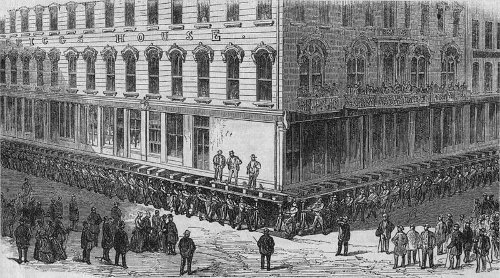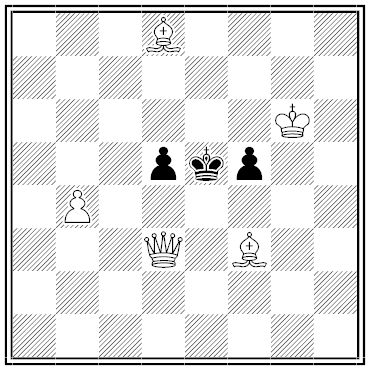I’ve accidentally turned the calibration dial on my bathroom scale, so its readings are skewed by a consistent amount. Apart from that it works fine, though. When I stand on the scale it reads 170 pounds, when my wife stands on it it reads 130, and when we stand on it together it reads 292 pounds. How should I adjust the scale?
Big Shoulders

Chicago faced a public health crisis in the 1850s as poor drainage led to outbreaks of cholera and typhoid fever. So they raised the town. Large sections of the central city were raised 6 feet on jackscrews while masons installed new foundations beneath them and installed pipes for sewage, water, and gas.
Surprisingly, this went pretty well. “An entire block on Lake street, between Clark and La Salle streets, on the north side of the street, was raised at one time, business in the various stores and offices proceeding as usual,” wrote historian Josiah Seymour Currey. “The facility with which buildings, light and heavy, were raised to the grade established became the talk of the country, and the letters of travelers and correspondents for newspapers abound with reference to the work going on and the odd sensations of going up and down as one passed along the streets.”
One oddity: The streets were raised before the sidewalks, so “until all the sidewalks were raised to grade, people had to go up and down stairs from four to half a dozen steps two or three times in passing a single block,” recalled Chicago Tribune publisher William Bross. “A Buffalo paper got off a note on us to the effect that one of her citizens going along the street was seen to run up and down every pair of cellar stairs he could find. A friend asking after his sanity, was told that the walkist was all right, but that he had been in Chicago a week, and, in traveling our streets, had got so accustomed to going up and down stairs that he got the springhalt and could not help it.”
Quick Thinking
A singular incident occurred in the last run of the Fitzwilliam Hounds, which affords another illustration of the cunning of the fox, and which placed the pack in considerable peril. The ‘find’ took place at Wadworth-wood, and the fox after heading for Rossington Station at a rattling pace, suddenly turned in the direction of Loversall village, where he sought concealment in a bed of rushes near the Carrs. He was, however, speedily compelled to quit his hiding place, and then made again for the railway, where he deliberately lay down on the permanent way and refused to budge. An express train was rapidly approaching, and the pack, being in imminent danger of getting upon the line and being cut to pieces, the huntsman reluctantly and with considerable difficulty drew off the hounds. The fox maintained his position until the express got within a short distance and then quietly made off.
— Times, Dec. 24, 1884
Regeneration
452 = 2025
20 + 25 = 45
453 = 91125
9 + 11 + 25 = 45
454 = 4100625
4 + 10 + 06 + 25 = 45
455 = 184528125
18 + 4 + 5 + 2 + 8 + 1 + 2 + 5 = 45
456 = 8303765625
8 + 3 + 0 + 3 + 7 + 6 + 5 + 6 + 2 + 5 = 45
(Thanks, Dheeraj.)
Black and White

From Alexander H. Robbins, A Collection of Chess Problems, 1887. White to mate in two moves.
Opting Out
A fellow at Windsor, who lately ate a cat, has given another proof of the brutality of his disposition — an instance too ferocious and sanguinary, almost, to admit of public representation.
He was at a public-house at Old Windsor, one day in the course of last week, and, without apparent cause, walked out of the house, and with a bill-hook severed his hand from his arm. His brutal courage was strongly marked in this transformation; for the inhuman monster made three strokes with the instrument before he could effect his purpose, and at last actually made a complete amputation. He asigns no other reason for this terrible self-attack than his total disinclination to work, and that this step will compel the overseers of his parish to provide for him during the remainder of his life.
— General Evening Post, Jan. 30, 1790
Benham’s Top

Cut out this disc, pierce it with a pencil, and spin it like a top. The colors that appear are not entirely understood; it’s thought that they arise due to the different rates of stimulation of color receptors in the retina. The effect was discovered by the French monk Benedict Prévost in 1826, and then rediscovered 12 times, most famously by the toy maker Charles E. Benham, who marketed an “artificial spectrum top” in 1894. Nature remarked on it that November: “If the direction of rotation is reversed, the order of these tints is also reversed. The cause of these appearances does not appear to have been exactly worked out.”
In a Word
anacronym
n. an acronym whose derivation few can remember
Know-It-All
In order for a god to be all-knowing, he must know even the fact of his own omniscience. But can he do this? He may know the totality of facts constituting the world; call this Y. But in order to know that he has mastered Y, he must also know that “There are no facts unknown to me” — and this is beyond Y.
It seems impossible that a god (or anyone) could ever be sure that nothing exists beyond his ken. “It makes no sense to imagine [a god] arriving at this limit, peering beyond it (at what?), and satisfying himself no further facts exist,” writes philosopher Roland Puccetti. But without this certainty he cannot be sure of his own omniscience, and so does not know everything.
A theist might argue that his god has created all the facts in existence. But an omniscient god would have to be sure of even this — that he is the sole creator, and that there are no facts unknown to him. And how could he come to this knowledge?
(Roland Puccetti, “Is Omniscience Possible?”, Australasian Journal of Philosophy, 1963)
Higher Education
Proper technique for examining an undergraduate, from a letter from Lewis Carroll to Henrietta and Edwin Dodgson, Jan. 31, 1855:
It is the most important point, you know, that the tutor should be dignified and at a distance from the pupil, and that the pupil should be as much as possible degraded.
Otherwise, you know, they are not humble enough.
So I sit at the further end of the room; outside the door (which is shut) sits the scout; outside the outer door (also shut) sits the sub-scout: half-way downstairs sits the sub-sub-scout; and down in the yard sits the pupil.
The questions are shouted from one to the other, and the answers come back in the same way — it is rather confusing till you are well used to it. The lecture goes on something like this:–
Tutor. What is twice three?
Scout. What’s a rice tree?
Sub-Scout. When is ice free?
Sub-sub-Scout. What’s a nice fee?
Pupil (timidly). Half a guinea!
Sub-sub-Scout. Can’t forge any!
Sub-Scout. Ho for Jinny!
Scout. Don’t be a ninny!
Tutor (looks offended, but tries another question). Divide a hundred by twelve!
Scout. Provide wonderful bells!
Sub-Scout. Go ride under it yourself!
Sub-sub-Scout. Deride the dunder-headed elf!
Pupil (surprised). Who do you mean?
Sub-sub-Scout. Doings between!
Sub-Scout. Blue is the screen!
Scout. Soup-tureen!
“And so the lecture proceeds. Such is Life.”
